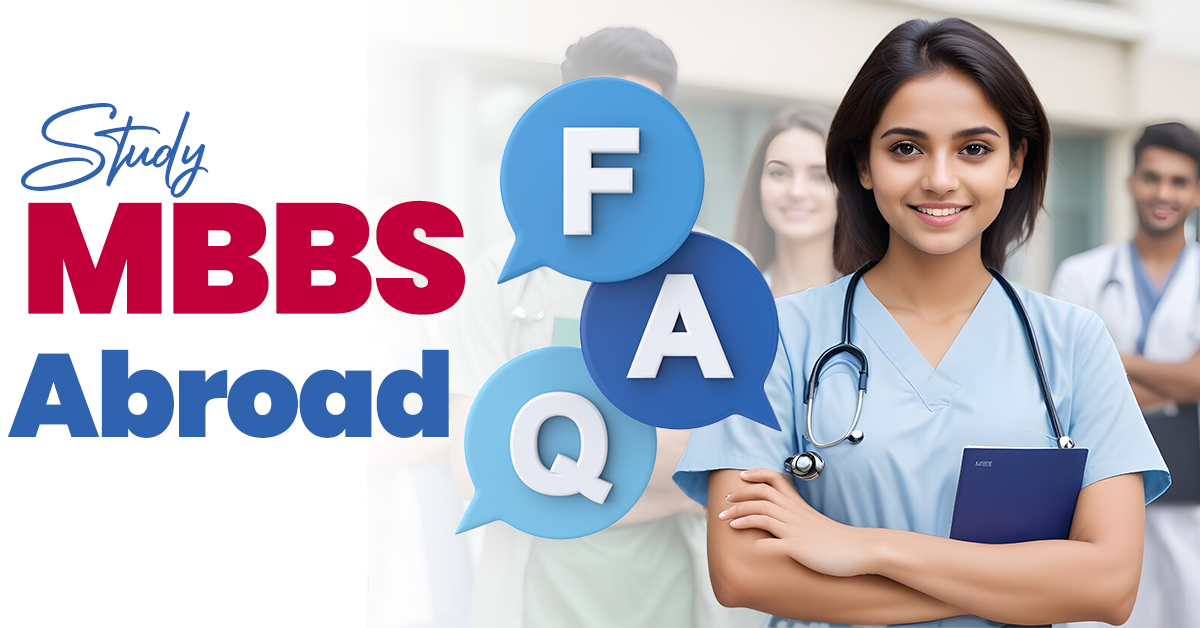
Studying MBBS Abroad has gained major traction among aspiring students looking for quality medical education abroad. With countless universities across the globe offering this degree, it’s natural to have a wide array of doubts and queries revolving around it. This comprehensive guide aims to address the most common questions about pursuing an MBBS abroad.
Is an MBBS degree from abroad recognized in India?
Yes, MBBS degrees from abroad are recognized in India. However, to practice medicine in India, you must clear the Foreign Medical Graduate Examination (FMGE), conducted by the National Medical Commission (NMC). This exam evaluates your medical knowledge and skills to ensure you meet Indian medical standards.
Which countries are best for studying MBBS Abroad?
Your ideal country for MBBS Abroad depends on factors such as budget, preferred location, language proficiency, and university ranking. Some popular destinations include:
Russia: MBBS in Russia offers quality and affordable medical education to prospective students. Russia is the home of top-ranked medical universities providing state-of-the-art facilities, cutting-edge resources, etc.
Bangladesh: Recognized by ECFMG, FAIMER, etc., and enlisted in WDOMS, MBBS in Bangladesh offers cost-effective, English medium options to students with a great emphasis on practical training to students.
Armenia: For the past few years, Armenia has been ranked among the top countries for MBBS abroad for Indian students looking for quality and affordable medical education.
South Americas: Modern infrastructure, an increasing number of English medium programs, and research opportunities are the few factors that make South America a preferred choice for aspiring medical students.
What are the eligibility criteria for MBBS Abroad?
Eligibility criteria vary across countries and universities. Generally, you'll need:
How much does it cost to study MBBS abroad?
The cost of studying MBBS abroad varies significantly based on the chosen country, university, living experience, and duration of course. However, the average cost of studying MBBS abroad varies according to the country selected for medical studies by Indian students. It ranges from INR 15 lakhs to INR 60 lakhs for top universities and colleges of MBBS abroad.
What are the job prospects after MBBS Abroad?
Graduates with MBBS degrees from abroad possess excellent job opportunities both in India and globally. After clearing the FMGE, you can practice medicine in India. Additionally, you can pursue higher studies like MD, MS, or PhD, or opt for residency programs in India or abroad. Job prospects extend to government and private hospitals, research institutions, and the pharmaceutical industry.
Also Read: Future Prospects - Career Options after MBBS Abroad
How can I get admission into MBBS abroad?
The admission process involves:
Do I need to clear NEET to study MBBS abroad?
While NEET is mandatory for getting admission into MBBS abroad. However, it's essential to check the specific requirements of the country and university you're targeting.
What is the visa process for studying MBBS abroad?
The visa process involves:
What is the medium of instruction in MBBS programs abroad?
The medium of instruction varies across countries and universities. However, English is the most preferred medium of instruction in top medical colleges and universities abroad as they have a large majority of international standards.
What is the duration of the MBBS course abroad?
The duration of MBBS abroad for Indian students is generally 6 years, including internship. However, it may vary depending on the country and university.
What is the quality of education in MBBS programs abroad?
MBBS abroad offers an amazing opportunity to prospective students considering pursuing an MBBS abroad. Countries such as Russia offer world-class medical education with modern infrastructure, experienced faculty, and practical training opportunities. It's essential to research university rankings and accreditations.
What are the living expenses for students studying MBBS abroad?
Living expenses can vary widely depending on factors such as the country, city, lifestyle, and accommodation choices. These expenses typically include the cost of accommodation and expenditure on food. Additionally, healthcare costs, including insurance and medical visits, along with personal expenses like clothing, entertainment, and miscellaneous purchases, all contribute to the overall cost of living.
Is it safe to study MBBS abroad?
Safety is a major concern for students looking to study MBBS abroad. But, it is essential to research the safety conditions for the chosen country and university. Most countries provide a safe environment for international students.
What are the advantages of studying MBBS abroad?
Studying MBBS abroad offers several benefits, including:
Pursuing an MBBS abroad is an attractive option for aspiring medical students seeking quality education, global exposure, and diverse cultural experiences. With numerous universities worldwide offering well-recognized programs, it's crucial to research thoroughly and understand the specific requirements and benefits of each destination. This guide aims to clarify common questions and provide a comprehensive overview of what to expect when considering an MBBS abroad. Whether it's the recognition of degrees, cost considerations, job prospects, or lifestyle adjustments, being well-informed will help you make a confident and well-rounded decision about your medical education journey.